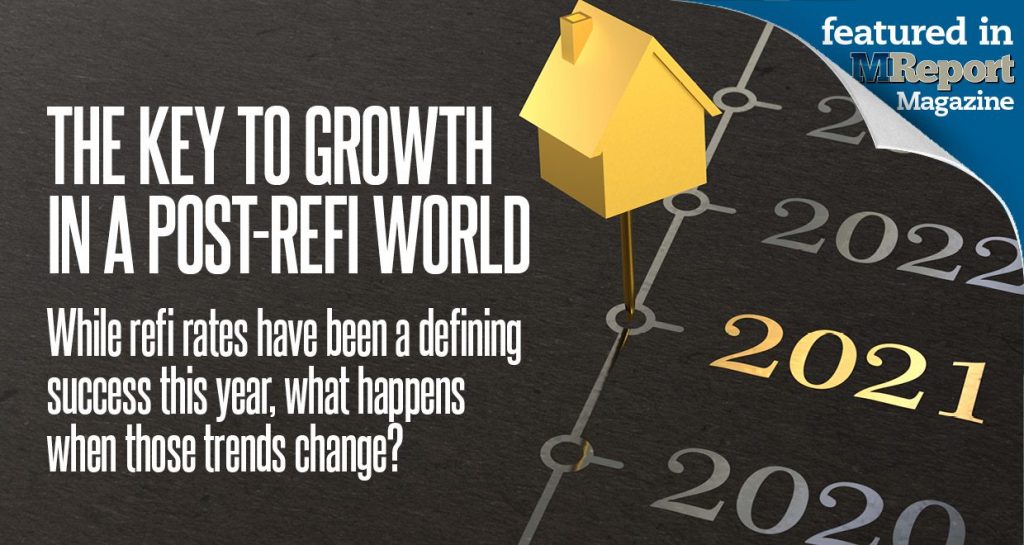
Editor's note: This story originally appeared in the November edition of MReport.
Over the past several years, we’ve experienced multiple refi booms that have enabled millions of borrowers to refinance their mortgages at least once, and often multiple times. Lenders, originators, and brokers have continually faced the prospect that the refi party will end, only to see it go on again and again.
With the benchmark 30-year fixed-rate mortgage now under 3%, we are facing the reality that rates cannot go much lower. So, while trying to keep up with the refi requests still pouring in, it might also be wise for brokers and originators to redirect their attention toward the future for a minute and to begin thinking about the type of sales approach that will generate business when the dust clears. This is where private money lending enters the picture.
Where the Market Is Heading
Once rates rise—which they eventually will—originators will begin flooding the purchase market all at the same time. Right now, however, there is one frequently overlooked source of business that has the potential for brokers and originators to separate themselves from the competition in a post-refi world. It can also fuel more growth than they realize, both now and when the purchase market returns. That source is private money loans for real estate investors, and the opportunities afforded by embracing this market segment are extraordinary.
Think about this: The average borrower on a primary residence gets a new mortgage every four years. The average real estate investor, on the other hand, finances four properties every year. Private money loans are also typically short-term bridge loans that investors may refinance into conforming loans, which gives brokers and originators the prospect of additional future business.
Another key benefit of private money loans is that they are much easier to approve and typically close in seven to 10 days rather than weeks or months, enabling borrowers to compete with cash buyers. The main reason for this is that loan-to-value (LTV) is the key approval determinant, not borrower credit scores or even debt-to-income (DTI) ratios. If there’s equity in the property, there’s a path to the finish line. If a borrower can’t make the payments, the equity in the transaction protects the lender.
Unfortunately, there are some misconceptions about the private real estate money market that are keeping some brokers and originators from seeing them as a viable option for their clients. For example, many people don’t know how to start or think that there’s so much more to learn. The reality is that private money lending is a lot less complex and challenging than conventional lending. In fact, it’s much easier going from the conventional space to learn the private money side of the business than vice versa. With the right private lending partner, it gets even easier—but not all players are the same.
Partnering with the Right Lender
When surveying private money lenders to partner with, it’s important to know how large and stable their business is. Make no mistake, the pandemic shook up the private money industry significantly. Many lenders were operating on a shoestring and didn’t have a lot of liquidity, and many of them got hurt. By halfway through April, roughly three-quarters of private money lenders put their businesses on pause or exited the market entirely. Only now are some of these lenders slowly reentering the market.
Private money lenders also have a fiduciary duty to ensure that borrowers do not get ahead of themselves—and if we think they are, we speak up. Part of our job is to make sure the investor gets it right, even if it means walking away from the deal. For example, investment properties that are hanging on the side of a hill, near railroad tracks, or next to an airport can, by their nature, be risky investments. If we don’t think they’ll work, our responsibility is not to say no necessarily, but to help them find a better way.
Most trusted private money lenders have budget experts on hand to make sure borrowers don’t get out over their skis, as they say. At CIVIC, for example, we offer one-on-one training through Zoom meetings, where we walk brokers through the process. Even those with no experience with private money loans can learn to qualify customers in no time.
A good private money lender will also have an excellent team of evaluation experts on board to help determine accurate property values. They will typically look at it as helping investors avoid a bad deal. It’s expertise that loan officers themselves don’t have to have, either—a high-quality private money lender will be happy to teach them and share their insights.
Make no mistake, interest in private money loans is growing. The private lending industry currently accounts for $50 to 60 billion in originations and growing, and institutional capital from Wall Street is pouring into this space, making it very lucrative. The largest conventional lenders are already aligning themselves with private money lenders because they understand the value of serving investors. Even though they are being overwhelmed with refi business now, more brokers and originators should be doing the same.
The Importance of Being a Lender for Everyone
Of course, it’s awesome to refi every borrower you can. However, experienced originators understand they need to be a lender for all borrowers, and they make sure they have other tools that are just as sharp and ready to go. Real business growth happens by looking beyond low-hanging fruit and anticipating future opportunities for growth before they happen.
Roughly 15-20% of the average broker’s prospect list is made up of potential investors who could use a private money loan to buy an investment property as a rental or fix and flip a property in today’s hot market. Very often, investors are also real estate agents, which makes them a great source for future business. To truly get ahead, brokers and originators need to build the discipline of continuing to pursue new business by growing their network and their database.
Another way to look at this is understanding the “lost opportunity’” cost of not being able to serve the needs of all your customers. If you’re not serving real estate investors, someone else is. Many originators feel as though they can’t afford not to sell refi after refi, and who can blame them? We all know rates this low won’t last forever. On the other hand, there is a cost to not serving your investor clients as well, since they are more likely to give you consistent repeat business.
Even if an investor doesn’t refi and instead sells their property, the opportunity exists for private financing for the new buyer. Frankly, there’s not a lot of nurturing going on among originators right now, so real estate investors are not getting the attention they deserve from lenders. The key is to long-term success is to make sure that a little bit of every day is spent investing time into cultivating new clients.
To be sure, the mortgage business is a feast or famine type of market. This isn’t the time to take up golf—it’s time to eat. For opportunistic originators, however, there is always more on the menu than it appears. And private money lending might be the most rewarding meal of all.

 theMReport.com Your trusted source for mortgage banking news
theMReport.com Your trusted source for mortgage banking news









